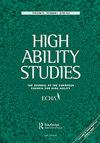Physical activity and self-concept in gifted students: A comparison with non-gifted students
IF 1.8
4区 教育学
Q2 EDUCATION, SPECIAL
引用次数: 2
Abstract
ABSTRACT Physical activity plays an important role in individuals’ physical and psychological health. However, there is scarce evidence on how physical activity is associated with socioemotional aspects in gifted students. This is of special importance since previous research showed that gifted students scored significantly lower on physical self-concept when compared with their non-gifted peers. This study aimed to measure the associations between physical activity and different dimensions of academic, physical, and global self-concept in a sample of 10- to 18-year-old Spanish gifted students. It also investigated differences with non-gifted students on physical activity, self-concept, and their associations. The study involved measuring the physical activity levels of 219 gifted and 242 non-gifted students through PAQ-A, following a cross-sectional design. It relied on SDQ-II and CAF to measure academic, physical, and global self-concepts and included the importance accorded to self-concepts. Results showed that gifted students scored higher on academic self-concept and lower on self-perceived athletic ability. Physical activity was associated with better physical and global self-concepts, with no differences between gifted and non-gifted participants. No interactions between giftedness and physical activity appeared. Both samples’ self-concept may benefit from physical activity equally. Strategies for promoting physical activity should be endorsed also in gifted students.资优学生与非资优学生体育活动与自我概念之比较
体育活动对个体的身心健康起着重要作用。然而,很少有证据表明体育活动与天才学生的社会情感方面有关。这一点尤为重要,因为之前的研究表明,与非天才同龄人相比,天才学生在身体自我概念方面的得分明显较低。本研究旨在测量10至18岁西班牙天才学生的身体活动与学业、身体和全球自我概念不同维度之间的关系。它还调查了非天才学生在体育活动、自我概念及其关联方面的差异。该研究采用横断面设计,通过PAQ-A测量219名天才和242名非天才学生的体育活动水平。它依靠SDQ-II和CAF来衡量学术、身体和全球自我概念,并包括对自我概念的重视。结果显示,资优生在学业自我概念上得分较高,在自我感知运动能力上得分较低。体育活动与更好的身体和整体自我概念有关,天才和非天才参与者之间没有差异。天赋和身体活动之间没有相互作用。两个样本的自我概念可能同样受益于体育活动。促进体育活动的策略也应该在天才学生中得到认可。
本文章由计算机程序翻译,如有差异,请以英文原文为准。
求助全文
约1分钟内获得全文
求助全文
来源期刊

High Ability Studies
Multiple-
CiteScore
4.80
自引率
11.10%
发文量
7
期刊介绍:
High Ability Studies provides a forum for scholars in a variety of disciplines associated with the development of human abilities to their highest level. It is a medium for the promotion of high ability, whether through the communication of scientific research, theory, or the exchange of practical experience and ideas. The contents of this journal are unique in reflecting concerns and recent developments in this area from childhood and across the whole life span in a variety of contexts. Far from being restricted to the traditional focus on high-level cognitive development, it also presents investigations into all other areas of human endeavour, including sport, technology, the arts, business, management and social relations.
 求助内容:
求助内容: 应助结果提醒方式:
应助结果提醒方式:


